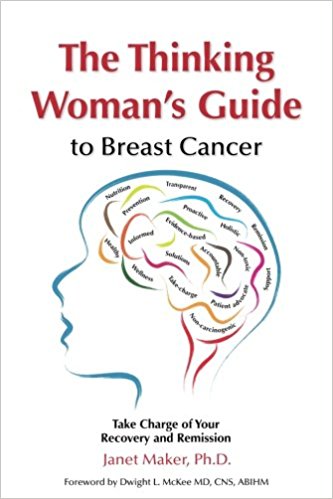
The Thinking Woman’s Guide to Breast Cancer came in first place in the nonfiction category of the 2018 IndieReader Discovery Awards, where undiscovered talent meets people with the power to make a difference.
Following find an interview with author Janet Maker, Ph.D..
What is the name of the book and when was it published?
The Thinking Woman’s Guide to Breast Cancer: Take Charge of Your Recovery and Remission, published in 2017.
What’s the book’s first line?
My cancer was found by accident.
What’s the book about? Give us the “pitch”.
When I was diagnosed in 2011, I, like most people, knew almost nothing about breast cancer. What I did know is that I didn’t feel safe simply following my doctors’ advice. I needed to understand for myself all my treatment options, the statistical outcomes for each option, and all the potential side effects, so I could make informed decisions. Because of my academic background and expertise as a researcher, I discovered a great deal about the disease and its treatments that few lay people are aware of. The Thinking Woman’s Guide to Breast Cancer is the story of my journey and the things I learned along the way. This information helped me to make informed decisions about my treatment, and it also helped me to make the lifestyle changes that I hope will keep me in remission. This is the book I wished I had before, during, and after my treatment.
What inspired you to write the book? A particular person? An event?
I had to struggle to get the information I needed to make informed decisions about my treatment. I knew that most patients do not have the resources I had to persist as long as I did. I did not feel sick, so I had plenty of energy; I had insurance that would pay for multiple opinions; I had enough money to pay for whatever the insurance didn’t cover; I was retired and my children were grown, so I had time; I had enough education so that I could read and understand some scientific literature; and I had a reasonably assertive personality. I am not an easy person to steamroll. It seems to me that patients who lack those assets wouldn’t stand a chance of being able to provide truly informed consent. I wanted them to have the benefit of my experience.
What’s the most distinctive thing about the main character? Who-real or fictional-would you say the character reminds you of?
This book is about my own experience.
What’s the main reason someone should really read this book?
People respond to serious illness in different ways. Some want to do what their doctors tell them and not think about it too much. Others, like me, need to understand as much as they can about their disease and its treatment. The book is for that second type—it will give them a great deal of help.
If they made your book into a movie, who would you like to see play the main character(s)?
Anyone who can seem intelligent and serious.
When did you first decide to become an author?
I see myself as a teacher more than as an author.
Is this the first you’ve written?
I have seven textbooks previously published in the field of College Reading.
What do you do for work when you’re not writing?
I have two websites with two newsletters and two blogs: TWGbreastcancer.com and JanetsGoodNews.org.
How much time do you generally spend on your writing?
I would say I spend about 20 hours a week on my newsletters and blogs. I’m planning on turning one of the blog series into a book.
What’s the best and the hardest part of being an indie?
My other seven books were published by major publishers (Prentice Hall and Wadsworth). I loved not having to do the marketing, which I do not understand and do not like. I also enjoyed working collaboratively with editors.
Would you go traditional if a publisher came calling? If so, why?
I was offered a contract by Rowan and Littlefield, but it was a bad contract, so I turned it down. I would sign a contract if it was a good one.
Is there something in particular that motivates you (fame? fortune? more sex?)
While an opportunity for sex sounds intriguing, I’m afraid that breast cancer is not likely to inspire passion. I am also in the happy position of not needing money. I really just want to express my truth and help others.
Which writer, living or dead, do you most admire?
Maybe Bertrand Russell, Erich Fromm.
Which book do you wish you could have written?
I would like to write a book that will save the world, but I can’t think of any that have.
